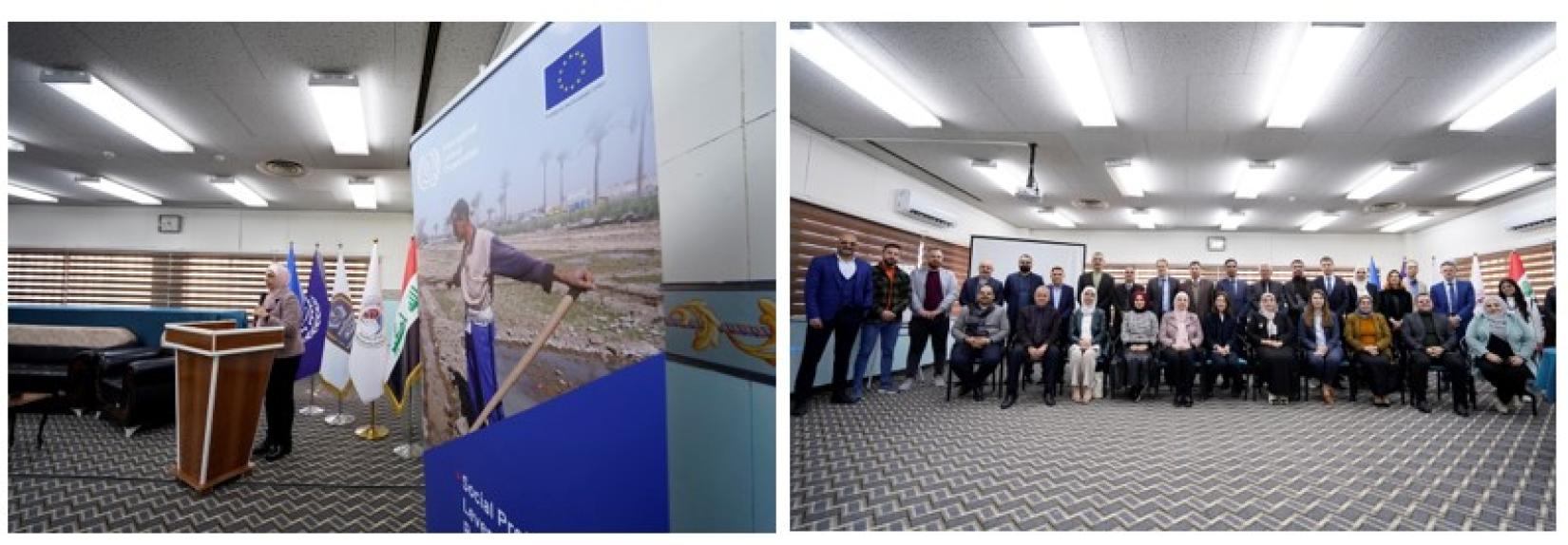Transformative potential of public works programme in Iraq’s Ninewa Governorate
13 February 2024
With the support of the EU, the ILO and Iraq’s Ministry of Planning held a tripartite discussion to establish the foundations for developing a strategic public works programme in the Ninewa Governorate.

12 February 2024
NINEWA, IRAQ (ILO News) – The International Labour Organization (ILO) in cooperation with the Ministry of Planning (MoP) and with the support of the European Union (EU) held a roundtable in the North Technical University in Mosul to discuss the potential of public works in generating decent jobs, extending social security coverage and contributing to reconstruction and sustainable local development.
The discussion brought together representatives from the government institutions, Iraqi Federation of Industries (IFI), trade unions and academia, fostering a dynamic exchange of ideas, knowledge and experiences on establishing a transformative National Public Works Programme in Iraq.
Dr Aliya Abbas Attar, the President of the Northern Technical University, opened the discussion by noting that public work programmes could provide an opportunity to better match education with the requirements of the labour markets. “Public works can provide on-the-job training for young people, improving their skills and making it easier for them to be employed and integrated into the labour market,” Dr Abbas Attar said.
ILO Country Coordinator for Iraq Maha Katta broadened the discussion by emphasizing that “a well-designed public works programme can establish the foundations for a stronger, more resilient and integrated social and economic system that is capable of providing sustainable decent employment opportunities to inhabitants, covering them with comprehensive social protection and fostering the preconditions for lasting peace and prosperity.”
The versatility of public works programmes in addressing multiple objectives, particularly relevant to the context of Iraq, was demonstrated through interventions by ILO experts. They pointed to key factors to consider in the design and implementation of public works programs, including their relationship with existing social protection and employment programs; the importance of incorporating decent work principles and skills training to support participants' transition into decent work; and considerations for identifying specific projects to be implemented within the programme. Moreover, the presentations referenced international best practices from various countries, including India, Greece, Jordan, South Africa, and the Philippines.
The technical session was followed by an engaging discussion on the steps to be taken by the Ministry of Planning and the Ministry of Labour and Social Affairs, workers' and employers' organizations, the private sector, civil society, and community-based organizations, as well as development partners, including the ILO, in Iraq to accelerate the development of a public works programme.
The proposals included conducting assessments and analyses to guide the design and implementation of the programme in the Ninewa Governorate; identifying sustainable financing sources for the initiative; adopting relevant policies and standard operating procedures; and enhancing capacities at both the governorate and local levels for the effective implementation of the programme.
Reflecting on the roundtable discussions, Ms. Alyaa Al Hammadi, Head of the Employment Policies Department in the Ministry of Planning, reiterated that the success of the public works programme in the Ninewa Governorate and in Iraq at large required genuine efforts from all relevant stakeholders. "It will also require overcoming all the obstacles that stand in our way together and allowing sufficient time for the programme to succeed. I believe that everyone is enthusiastic about public works that would benefit both the community and the country," she said.
Wrapping up the workshop, Ms. Barbara Egger, Head of Cooperation for Iraq at the European Commission, emphasized that Iraq is at a stage where all components of the larger puzzle are coming together — the need for construction and reconstruction for the future, a qualified youthful workforce, social security for private sector workers, and available financial resources — which could be invested in the collective effort on public works. "The Ninewa Governorate has the opportunity to move forward and create more and better jobs that also contribute to the public good," she concluded.
The event was conducted as part of the EU-funded Social Protection Programme for Iraq: “Leveraging Effective Response and Accelerating Reform”, which is being jointly implemented by the Government of Iraq, ILO, UNICEF and WFP.

